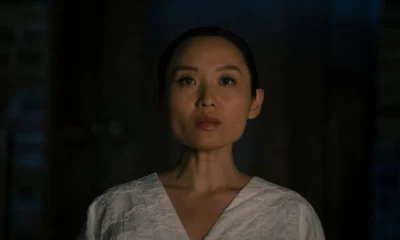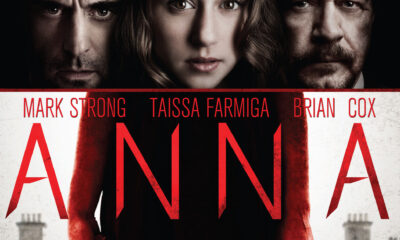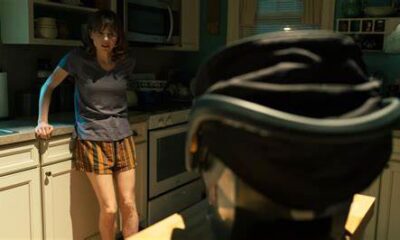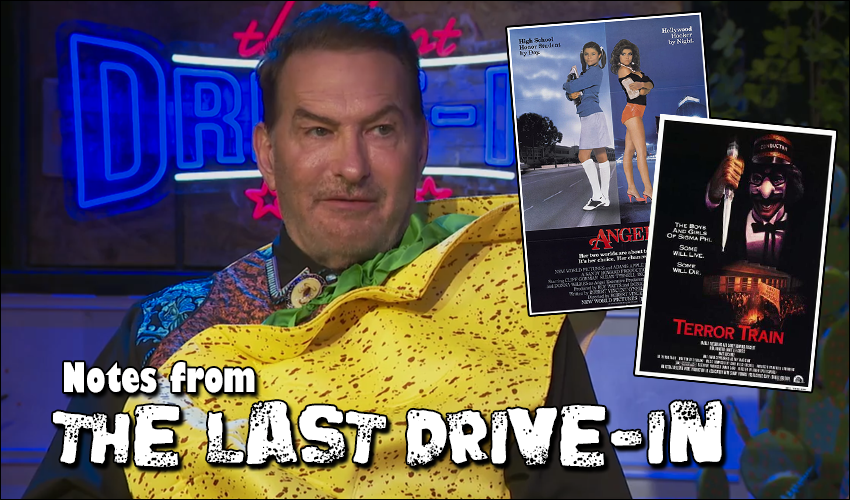
Notes from the Last Drive-In: Halloween Hoedown
Welcome to “Notes from the Last Drive-In,” Haunted MTL’s review and recap series of The Last Drive-In with Joe Bob Briggs on Shudder. This time we cover the “Halloween Hoedown” which brought us 1983’s Angel, and 1980’s Terror Train. We also were given two pretty important guests when it comes to modern horror – director David Gordon Green and mega-producer Jason Blum of Blumhouse Productions. They stopped by the trailer (yay, back at the trailer!) and talked a bit about the upcoming Halloween Kills, horror as a whole, and even joined in on some light Halloween fun.
But, looking at the movie selection – it doesn’t feel very Halloweeny, does it? Let’s get into it, shall we?
Angel (1983)
Angel (1983) is Roger Vincent O’Neil’s exploitation revenge thriller about teenage Molly, who by day is a sweet honors student, but by night is Angel, a sex worker on the streets of Hollywood Boulevarde, living with an eclectic community of sex workers and outcasts. However, Angel soon finds herself in the midst of a serial killer’s spree who targets people in her line of work.
The movie is not exactly horror but certainly delves into horror themes of predation, loss of innocence, poverty. It is a very tense film and at times it can be absolutely gutwrenching. In lesser hands, the film may have come off as cloying and preachy, but the approach here is excellent and ultimately becomes a rousing story by the final act. It may seem strange to read, but a film about a 15-year-old sex worker is quite an empowering film, arguably feminist to a great degree.
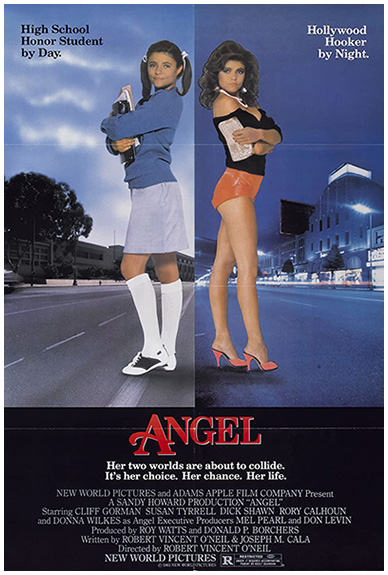
It is the brainchild of Robert Vincent O’Neil who directed and co-wrote the film with Joseph Michael Cala. The film was produced by Donald P. Borchers and distributed by 80s genre-powerhouse New World Pictures. The cast is led by then 21-year old Donna Wilkes playing Molly/Angel, with Dick Shawn, Rory Calhoun, and Susan Tyrell rounding out the oddballs she associates with. Cliff Gorman plays Lieutenant Andrews, the copy who keeps an eye out for Molly, and John Diehl plays the nameless killer.
As a whole, the performances are fantastic across the board. The film uses its veteran and character actors to a great degree of effectiveness. Particularly those in Molly’s street family. Dick Shawn and Susan Tyrell have some utterly fantastic exchanges, and Rory Calhoun, the western veteran, ends up as the coolest gun-slinging street uncle anyone could ask for. Gorman’s portrayal of a hard-working cop is good and actually results in a cop who does good things – though some of his methods may be questionable. It is especially helpful that there is no sign that he wants to help Molly beyond the fact he genuinely is worried about this kid. In a lesser movie, it might play up some sort of cringe-inducing romantic element.
The two performances I would focus on here are Donna Wilkes’ and John Diehl’s. Wilkes is good, even as a relative unknown, to keep up with actors like Shawn, Calhoun, and Tyrell. She is completely charming and does some fantastic emoting with her eyes. Her work as Molly crafts an incredibly sympathetic and strong character. This is especially true as her character changes and grows, becoming the hunter by the film’s final act. Her rich characterization and growth are complemented by John Diehl’s enigmatic and unstable killer who remains unnamed, with only a single line of dialogue after he has been chased down by a 15-year-old girl wielding a revolver in her canary-yellow sundress. True to his skill here, he eats an egg in the most disgusting and horrifying way ever seen and it is a wonderful, stomach-turning bit of characterization.
As for the more technical elements of the film, the cinematography of Andrew Davis is excellent. Using some clever camera tricks and B-roll he manages to really populate the scenes during a time when crowds weren’t as heavy. His photographic eye would serve him well as a director of action thrillers like Under Siege and The Fugitive. Also, he directed Holes, oddly enough. Charles Bornstein’s editing, particularly during the final “chase” of the film is also excellent and combined with Davis’ framing goes a long way toward making the role reversal work.
Also of note, the score by Craig Safan utilized heavy synthesizers and gives the film the aural landscape of the 1980s without diving too deep into what would become the cliche 1980s sound. Even more impressive is that the score was written in less than a week.
Joe Bob-servations
Joe Bob’s observations about the film are about what you would expect: funny and educational. Many of his observations and facts about the production naturally work their way into my review for context. What I want to talk about is a bit of fun during the segments. The prevailing theme of the night was a level of cantankerousness regarding the fandom and the previous Halloween special. It was fun and the grouchy Joe Bob character was quite welcome but also felt a little too defensive at times.
But the main draw of the evening was our venerable host sitting down with David Gordon Green, director of Halloween (2018), and the upcoming Halloween Kills. Green was a great guest for the show, showing his chops when it came to discussing the film. One of the more interesting discussions was on the state of horror, particularly in the streaming world, and what was ahead for David Gordon Green, including an upcoming Hellraiser show.
Final Thoughts on Angel (1983)
Angel was surprisingly good. This was my first time seeing it and I was floored by how complex of a film it was. While I am not sure how well it worked as a Halloween film for a Halloween special, it is definitely a portrait of drive-in excellence. It seems that the series it spawned, of four films, is a case of diminishing returns, but the first movie was so good I wouldn’t mind seeing what happens to Molly going forward. I also didn’t mention this much, but the more progressive streak in the film also proved interesting and worthy of future exploration.
 (5 / 5)
(5 / 5)
Best Line: “Well, we better get over there before she ends up in the tomb for the unknown hooker.” – Mae
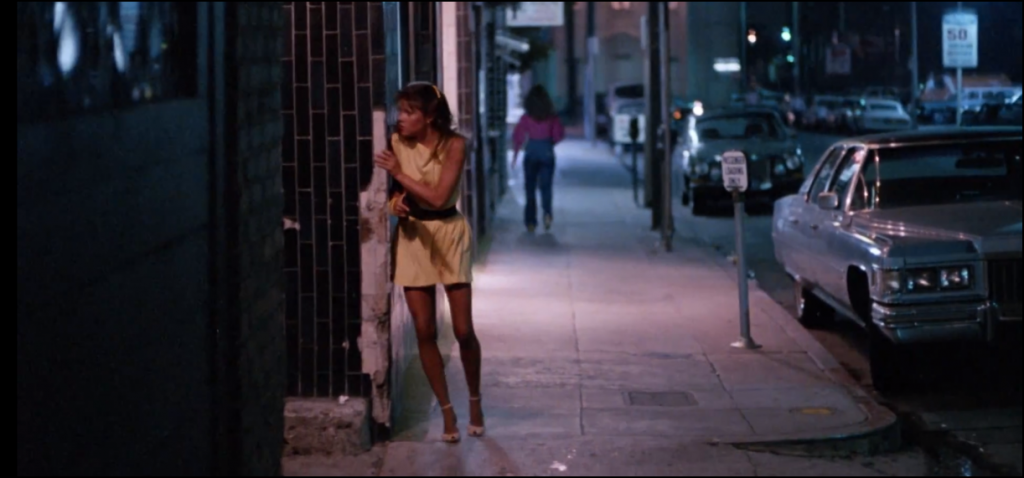
Terror Train (1980)
The more traditionally “Halloween” film of the night was Roger Spottiswoode’s Terror Train – though that is more in spirit than setting as this movie takes place on New Year’s Eve. The film follows a group of pre-med students after a tragic prank three years prior as they board a train for a New Year’s Eve party. Unbeknownst to the partygoers, the consequences of their actions are fast approaching in the form of a mysterious, masked killer.
The film, early enough into the formation of key slasher tropes, is novel enough. It isn’t as meticulously approached as John Carpenter’s Halloween, nor as satirical as The Texas Chainsaw Massacre, not as groundbreaking as Bob Clark’s Black Christmas. However, it is still a very solid slasher with some fun spins on what would become hallmarks of the genre. It also helps that the solid direction of the film by Roger Spottiswoode makes use of the claustrophobic setting quite well. How can a killer move so unimpeded in a commuter train? Spottiswoode does a good job at making the space itself a threat.
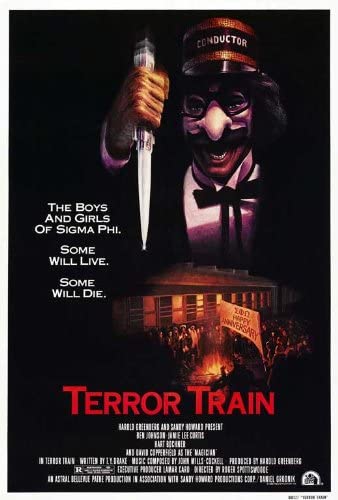
Rounding out the production side of the film, the screenplay was crafted by T. Y. Drake and the overall producer was Harold Greenberg. The movie is a great example of that “Canadian Funny Money” period Joe Bob Briggs has mentioned before – where productions were given heavy tax rebates for shooting in Canada. Terror Train was specially filmed in Montreal during the coldest months of the year, and just after Prom Night had wrapped. It is an independent film, but found a distributor in 20th Century Fox.
As for the performances, the film features Jamie Lee Curtis as Alana Maxwell, who represents the final girl trope quite elegantly. The film also features veteran actor and rodeo cowboy Ben Johnson as Carne, the train’s conductor. Rounding out the cast, are Hart Bochner as “Doc,” Timothy Webber as “Mo,” Sandee Currie, Vanity (yes, that Vanity), and drag artist Derek MacKinnon. Also, for some reason, David Copperfield is in the movie – yes, the magician.
Jamie Lee Curtis is pretty understated here. She doesn’t have quite the type of leading lady role she did in Halloween and Prom Night and the character succeeds as likable through the sheer force of her charisma alone. Derek MacKinnon is interesting, though largely relegated to being disguised. Despite this, MacKinnon chews the scenery pretty well, particularly given the surprising reveal at the climax as to who the killer is. The best performance of the film is from Ben Johnson, but he plays a sort of stock character in over his head and trying to solve a mystery far above his paygrade, but goddamn does he give it his all. Also, David Copperfield does some magic tricks that just feel fake because we’re seeing them in a film. That is why you only see magicians do their craft in person.
Technically speaking, the movie is quite effective and doesn’t feel like a quick cash-in that some might assume. The cinematography of John Alcott is particularly effective given the relatively small spaces on the train. It also helps the effects team were able to make the train seem mobile when it was parked for the entire shoot. If Alcott sounds familiar it is because he was Stanley Kubrick’s most trusted cinematographer, working with him on 2001: A Space Odyssey, A Clockwork Orange, Barry Lyndon, and The Shining. He won an Oscar for Barry Lyndon. One of Alcott’s innovations on the set was to rewire the lighting on the train and use dimmers outside of the train cars to help simulate the movement of a train.
Anne Henderson’s editing is great, giving the film enough angles per scene to give viewers a sense of space. As for the score, I didn’t find the film to have a particularly memorable soundscape. The music is just sort of there.
Joe Bob-servations
Naturally, there was a lot to say on Terror Train, a true slashic, but it seemed the real draw for the night was getting to hear Jason Blum, David Gordon Green, and Joe Bob Briggs talk all things horror, past and present. While Jason Blum’s energy felt a bit too “producer” at times, especially compared to Green and Briggs, his presence was quite insightful. Especially because he is perhaps one of the biggest names in horror production in history, let alone now. It was interesting to hear the trio talk about how movies come about and how modern-day creative partnerships work, and it was also rather reassuring. You get the sense that Blum understands the influence and precariousness of his company and he is quite keen to foster and empower relationships with creators, with Green seeming particularly close. It’s rather pleasant to see.
There was, of course, plenty of talk on Terror Train and classic horror. Particularly fun was the revelation that David Gordon Green’s Frankenhooker t-shirt came from Joe Bob Briggs himself. Green was a fan and sent in for it. An interesting discussion revolved around Green’s education at the University of North Carolina School of the Arts – a smaller school that has provided some great alternative voices in the film industry.
Final Thoughts on Terror Train (1980)
Terror Train is most certainly a classic slasher for a reason. it came out early enough to where the novelty of putting a masked killer in a different scenario or set-up didn’t feel like as big a shortcut as it does now, it had in-her-prime scream queen Jamie Lee Curtis, and did something very interesting with the killer swapping costumes from kill to kill, servicing as a codifier of that trend early on. The film was also fairly progressive in casting a drag performer, Derek MacKinnon, as the killer without necessarily commentating or making a value judgment on drag. It is not the drag that is the problem here, it’s the killing!
 (4 / 5)
(4 / 5)
Best Line: Alana Maxwell: “No. Kenny, you’re better than he is. I’m sure you’re better than he is.”
Kenny Hampson: “I am. He didn’t know how to cut a woman into pieces.”
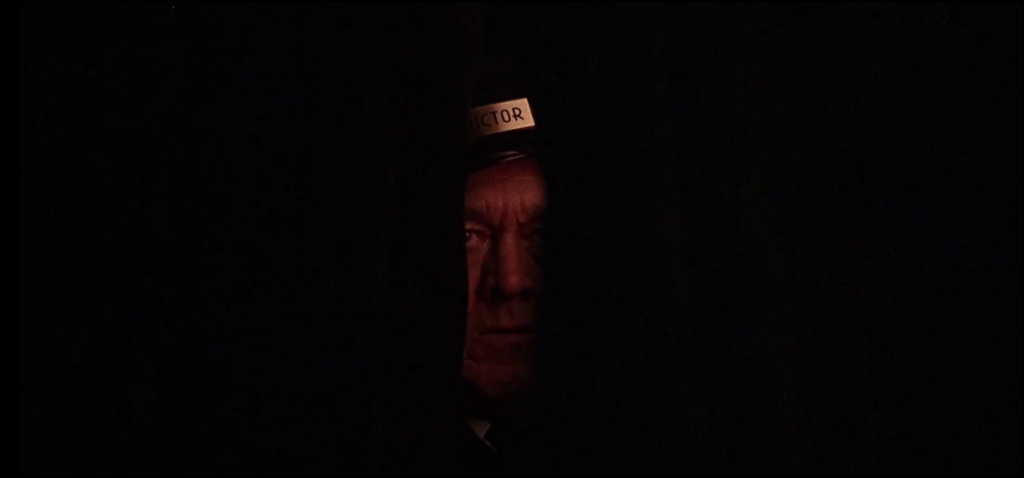
Haunted MTL Drive-In Totals
As always, let’s take a look at the official Drive-In Totals:
As for our totals:
- 0 Yuki (rectify this next time, Shudder)
- 2 Street Dads
- 2 Time Horror Hottie
- 2 Guests
- 3 1/2 Minutes of film to shoot with
- Gratuitous Halloween discussion without showing Halloween
- Gratuitous 70s Stage Magic
- Gratuituous Samhain History Lecture
- Gratuitous dissection of the term “microbudget”
- Suprise Drag Night
- Pumpkin Censoring
- Halloween Joking
- Abrubt Ending Fu
- Half-assed Costume Fu
- Joe Bob Fan Club T-Shirt Fu
- Slumber Party Horror Movie Fu
- Krishna Assault Fu
- No Silver Bolo Award!
- Cosplay: Taco Joe Bob, Caultiflower Pizza Darcy, Angel/Molly Darcy
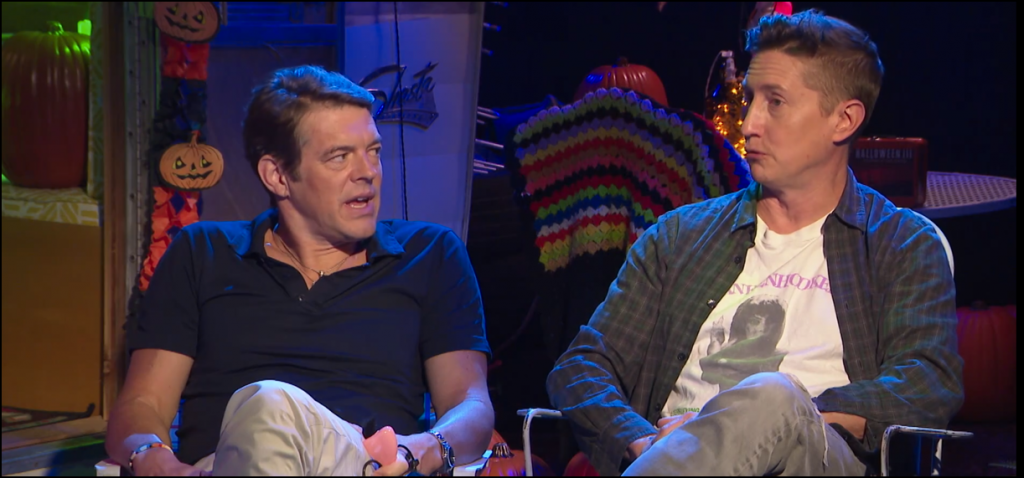
Episode Score
As a whole, the evening was fun but also felt unusually loose in concept compared to other specials. If it weren’t for a couple of the Halloween accouterments and a visit from some of the team behind the upcoming Halloween Kills, you’d be able to mistake this for a general night at the Drive-In. With that being said, an general night on the Drive-In is perfectly fine and if this were a midseason episode it would be great.
So no, Joe Bob, you didn’t “ruin Halloween again,” nor have you ever, but as entertaining as this was there is an expectation of something a little more thematically appropriate. One cannot necessarily fault the fans for thinking so – especially given the guests. All in all, a fun episode with a great double feature – but as far as a Halloween show goes, a little too far outside the margins.
 (4 / 5)
(4 / 5)
I hope you enjoyed this recap and review of Shudder’s The Last Drive-In with Joe Bob Briggs. We don’t have a date for the return of the show for a full season, but we do know some more specials are on the way. Naturally, we are going to cover them as they release.
In the meantime, please share your thoughts with us about the show, the review, or the movies from the special. We’re dying to hear from you.
Movies n TV
Wheel of Time A Question of Crimson Is a Political Espionage Delight
Episode two of Wheel of Time felt like the beginning of a long journey. Stories are unfolding, lives are changing, and blood is spilling.
Let’s discuss.
The story
We begin this episode in the past with Elayne’s mother, Queen Morgase. It turns out her rise to the throne was a bit, shall we say, cutthroat. So when she shows up at the White Tower, Siuan is concerned.
She might have reason to be, too.
Meanwhile, Rand, Egwene, Moiraine, Lan and Aviendha are in the Spine of The World. As they travel through some of the most breathtaking lands I have ever seen on a TV show, Egwene is plagued with nightmares. We think at first that’s just her trauma working itself through her system. But we soon find out that it might not be that straightforward.
Finally, Perrin returns home to heal after his hand is almost cut in half. But when he gets there he finds the town has been infested by Children of The Light. And they’re looking for him.
What worked
There was something heartwarming in this episode about political espionage and choking religious persecution. And that is Elayne’s relationship with her family.
I have consumed a lot of fantasy content with royal families. And I have never once heard a princess call her mother ‘Mum’. I’ve never seen royal siblings get along. And I have sure as hell never seen a princess have a good relationship with her step-parent.
This was refreshing. Even though Queen Morgase is kind of a horrible person she seems like a good mother. And that’s an unexpected delight.

Of course, this is just one storyline among many. And while this can sometimes be overwhelming, in this case it wasn’t.
I’ll be honest, some of these storylines are going to drag for me. I know this because I’ve read some of the Wheel of Time books and I have an idea that not all the characters exactly pique my interest.
No one likes all the characters. No one likes all the storylines. While I am here for the political espionage between Queen Morgase and Siuan, not everyone likes it. While others might be fascinated with Selene trying to win Rand back, I couldn’t care less.
Having multiple storylines keeps everyone’s attention better. So long as things don’t get out of hand. Things can easily get out of hand. But this seems to be managed well.
So far.
What didn’t work
As I mentioned above, I’m not thrilled with Rand’s story at this point. And while it’s fine to not like a storyline when there are this many to choose from, it’s not fantastic that the one I like the least is the one involving our two main characters. And anytime we were with the team at the Spine of The World, the only thing that brought me joy was Moirain’s hat. It reminded me of Stockard Channing’s hat in Practical Magic.
The problem is that Rand is Charlie Brown with controversial magical powers. He is boring, serious, and pessimistic.
And yes, I understand that he has a heavy emotional burden and he’s the Dragon Reborn and that’s quite taxing and all. But let’s be fair, there isn’t a single person in this show that doesn’t have a heavy burden. And most of them manage to be fun occasionally.

All that being said, this episode of Wheel of Time did exactly what it needed to do. It set up conflicts at each of the three locations. It established emotional ties between the characters and the events. And it established goals for everyone.
This was, in short, a solid episode. Not groundbreaking, not mind-blowing or life changing. It was simply good. It was entertaining and moved the plot forward.
Well done.
 (3.5 / 5)
(3.5 / 5)
Movies n TV
Wheel of Time Returns With A Bang
Wheel of Time is back for season three. There are mixed feelings regarding this. Last season, there were some serious pacing issues. And some serious sticking to the book’s storyline issues. But we’re two seasons in, and we don’t give up so easily. So let’s dive into episode one, To Race the Shadow.
By the way, I highly recommend watching this episode with the subtitles on. You’ll see why.
The story
We begin this episode with Liandrin facing a trial of sorts for her rampant betrayal. She does her best to gaslight her Aes Sedai sisters into thinking that Siuan Sanche is the real traitor.

When that doesn’t work, she reveals how many Black Aes Sedai have actually infiltrated the tower.
Spoiler, it’s a lot.
In the aftermath, our whole team gathers to drink and enjoy one night of relaxation before they head out to the Tear to form an army for Rand. All is going well until they’re attacked by myriad creatures and a sentient axe.
What worked
This episode was long. It had a run time of an hour and eleven minutes. And a lot of that run time was spent in heavy dialog scenes.
Fortunately, these were well-done scenes.
If you’re going to have a lot of talking scenes, there are good ways and bad ways to do it. Last season, we saw lots of examples of the bad way to do it. But this episode did it well. For one thing, other things were going on while conversations were taking place. The characters are drinking, playing games, walking through an interesting city. And the scenes themselves didn’t stretch out. They weren’t repetitive. We heard what the character had to say, then we moved on.
It was also nice that the point of these scenes wasn’t just info dumps. We had character development. We had romantic interactions. We had plot development and foreshadowing.
Overall, this episode felt like what it was. A moment of calm before a storm.
Taking a step back, I’d be remiss if I didn’t address the fight scene at the start of the episode. Because it was epic.
The magic looked amazing. The martial arts that went along with it looked fantastic. The costumes were beautiful. It was just incredibly fun to watch.
More than that, it was emotional. We lost some characters in that fight that were important. And it was clearly emotionally shattering for many of our characters, who found themselves betrayed by people they trusted.
So many of them.
It was a great way to open the season.
What didn’t work
Despite that, this episode wasn’t without its flaws.
First off, there were a lot of dialog scenes. And they were good scenes, as I’ve already discussed. But it was one after another after another. And when your episode is, again, an hour and eleven minutes, it’s maybe a little much to have so much chit-chat. Couldn’t some of these conversations, important as they were, have been moved to maybe another episode?
Finally, I want to talk about Egwene’s travel through the arches.

I feel like maybe there were some deleted scenes here. Because there must have been more to that visit than what we saw, right?
We could have seen Egwene battle Rand. That would have been badass and emotionally devastating. We could have seen her with a quiet life with Rand back home at the Two Rivers. We could have seen anything except for the quick clip of Rand in a bloody river, followed by Egwene being shoved back out in a bloody shift.
Bad job. But at least it wasn’t an extended scene of Moiraine collecting bathwater, and then taking a bath while looking sad. If we’d started this season with another scene like that, it might have broken my brain.
Amazon dropped the first three episodes at once. So we’ll be back soon to talk about episode two. See you then.
 (4 / 5)
(4 / 5)
Movies n TV
Entertaining as hell: Eight Legged Freaks (2002) Review
Early 2000s is a special era for the industry. It accepts the cheesiness and corniness of movie making, in turn producing some gems in their own right. Eight Legged Freaks starring David Arquette and young Scarlet Johanson is a horror comedy about giant spiders who overtake a small town. As crazy as that premise sounds, the movie surprisingly has a ton of heart and is super entertaining. Let’s review, shall we?
Plot
We start Eight Legged Freaks with a shot of toxic waste spilling into the water supply of Joshua, a spider farm owner. He is friends with Mike, one of our protagonists, who is a science geek and a spider enthusiast. Mike notices something quite right upon visiting Joshua, but no one takes him seriously. We are then introduced to the rest of the crew. Mike’s mother Samantha, the town sheriff, is too busy chasing Ashley, his sister, who is dating the town mayor’s son Bret (something Samantha does not approve of). We also have Chris, who returns to the town to save his father’s legacy in the town mines. He has opposition from Wade, Bret’s father, who wants to use the mines for his business ventures. Lots of drama going on that will only get juicier once the spiders get loose.
The creepy crawlies quickly dispose of Joshua and make their grand appearance after Ashley rejects Bret’s advances, abandoning him in the middle of a desert. A glorious chase sequence ensues as the spiders make their way towards the town, wreaking havoc on its residents. In a true horror fashion (which the movie acknowledges), it takes some convincing from Mike and then from Samantha for the town to take the threat seriously. The tongue-in-cheek style of narrative adds the comedy aspect to a movie that would otherwise burn out fairly quickly.
The remaining characters hide out in a shopping mall as it’s the only somewhat sturdy building in the area. This doesn’t last long as the spiders break in, forcing them to run through the mines. Their resources to fight the creepy crawlies off are limited as the methane gas doesn’t allow them to use firearms. Such conditions require resourceful thinking from Chris, who uses perfume to fend off the leader of the spider group and save himself during the climax of the movie.
Character dynamics are not forgotten once the action kicks in. We have Chris confessing his long-term feelings for Samantha which she knew all along, which provided some comedic relief. Bret also reunites with Ashley and apologises for being an asshole. Mike finally gets the appreciation he deserves as his knowledge saves the townsfolk more than once during the whole ordeal.
We end the movie with the town’s radio show person telling the story as an urban legend during his segment. This brings it into question – how much of it happened the way he said it did? We can only guess…
Overall thoughts
Eight Legged Freaks is a fun creature feature with some self-aware commentary on genre tropes that doesn’t take itself too seriously. The acting is good, the pacing fitting and the characters are likeable enough for you to want them to make it through. Definitely a must watch, if you don’t suffer from arachnophobia, that is.
 (5 / 5)
(5 / 5)








